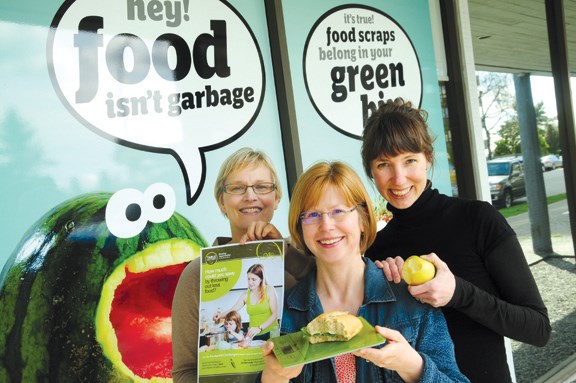A new initiative is encouraging community members to take a closer look at their preventable food waste.
The North Shore FoodPrint Challenge, launched Monday, is a month-long project being presented by the Table Matters Network. Comprised of people who live, work and eat locally, the network aims to make healthy food accessible for all, and supports a sustainable food system through the promotion of food policies and community development projects.
The goal of the North Shore FoodPrint Challenge is to encourage community members to waste less food, thereby saving money as well as reducing their environmental impact.
Recently, the network has been running a food rescue project, attempting to connect grocery stores with community organizations that could benefit from edible products - items like bruised apples, for example - that were previously being put in the trash.
"We wanted to do something that was more targeted towards the public because actually when you look at the Canadian statistics, half of food waste that happens in Canada, happens in households," says Margaret Broughton, chairwoman of the Table Matters Network and a public health dietitian with Vancouver Coastal Health.
The network reports that $31 billion worth of food is wasted in Canada annually, with 47 per cent occurring in the home. An average Canadian family of four throws out approximately $1,500 worth of food per year.
Reducing food waste can also positively impact the environment as it reduces wasted resources required to grow, package and transport food - fuel and water included.
The North Shore FoodPrint Challenge was also launched in light of Metro Vancouver's recent ban of food scraps in regular garbage. "This is supporting that initiative and again nudging people to examine how much we're throwing away," says Broughton.
To participate in the challenge, interested community members are encouraged to keep track, either by weighing or giving an estimate, of their preventable food waste for five days until April 30.
Preventable food waste doesn't mean non-edible things, like egg shells or vegetable peels; rather, it refers to any food that could have been eaten but was thrown out, including items that expired or went uneaten, like leftovers.
"We all have that. Once a week, we all go into our fridge and say, 'Oops, didn't get to that,' so it's those types of things," says Broughton.
The first 85 registrants can receive a free digital kitchen scale, available for pick up from the North Shore Recycling Program, a partner in the initiative. All participants will receive shopping, meal planning and food storage tips (for example, how to make cheese last longer), as well as recipes, via email.
After completing the fiveday challenge and reporting their results, participants are asked to fill out an online survey, earning them entry into a weekly draw for grocery store gift cards.
Survey results will be used to inform future educational programs and resources. "We're not judging anybody, we're just raising awareness and trying to create a bit of buzz around this issue," says Broughton.
"Maybe we can use what we have better, do better planning and make sure we're actually getting the most out of our food dollar," she adds.
The North Shore FoodPrint Challenge is also made possible with the support of the Vancouver Coastal Health North Shore Population Health Program, and Farm Folk, City Folk.
Another effort currently underway by those involved with the Table Matters Network is their continued efforts to establish the North Shore Food Charter, outlining principles around an integrated local food system, taking into account issues like food production, distribution, access, consumption, processing and waste handling. So far, the charter has been endorsed by five municipalities, two school districts, Vancouver Coastal Health and the Tsleil-Waututh Nation. An official charter signing ceremony is planned for May.
tablematters.ca



